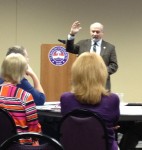
On Friday October 19, I had the privilege to attend the College of Health, Education, and Human Development’s Research Forum at Clemson University. Dr. Gary Machlis, Science Advisor to the Director of the National Park Service, was the invited speaker. He gave an informative and inspiring presentation on “Interdisciplinary Research: The Litany of Difficulty and What to Do About It.” His practical advice originates from years of experience and keen intelligence. I am so taken by his words I feel compelled to share them.
From Dr. Gary Machlis, advice for overcoming barriers to and conducting interdisciplinary research:
- Accept that interdisciplinary research is hard. Global issues we face are not isolated by discipline, therefore finding their solutions demands work across traditional disciplinary lines. This will be difficult, but to try to solve problems in discipline isolation is foolish.
- Find a common language. As disciplines diverge, multiple definitions for terms become common. Creating a common language can be as simple as writing a list of terms and their definitions on a large sheet of paper for the duration of a meeting. Outside of the meeting, scientists can recognize their own definitions, but during the meeting, there must be agreement for productive communication to occur.
- Buy a thesaurus. Recognize that certain terms carry connotations that may be unappealing to one or multiple parties. A well-used thesaurus can foster agreement when differences arise.
- Share historical knowledge. Have all parties take time to learn the history of the other discipline(s). This does not have to be a detailed course, rather it can be as simple as reading through “A Very Short Introduction…” This will foster healthy respect across disciplines an essential element to number 5.
- Avoid hubris. Check your ego at the door. No one science is superior to another. There is only poorly conducted science and well done science. Quality supersedes discipline.
- Share your data. Before you begin a project, outline how data will be shared among all parties. Large, cumbersome datasets are the norm, making them accessible to all team members is imperative to success.
- Read widely. After gaining an appreciation for the other science(s) on the team, look to sources as diverse as novels, news outlets, and popular magazines. Also, speak widely: engage with individuals from all walks of life. Ask the taxi driver what she thinks about climate change and the waitress what he knows about biodiversity. Reading and speaking beyond discipline borders will broaden perspectives and allow new ideas to flow.
Dr. Machlis also gave what he holds as the two highest qualities of a researcher:
- Curiosity. A researcher must be driven to find the answer regardless of her hypothesis. Do not pursue questions that bore you; this can lead to sloppy science. Instead pursue topics that cause feelings of uncertainty and excitement – this will stimulate growth and foster innovation.
- Kyosei. For this Japanese term, Dr. Machlis gave the rough translation “working toward the common good.” Research and science have an immense opportunity to serve the greater good, this should not be wasted. At every step in the research process, ask “if this, then what?” How will your work serve the common good?
I left the room inspired, and I hope you too can experience the power of his advice. Interdisciplinary research is challenging, but holds immense potential to solve global problems. It is the future, and we can embrace it with the advice from Dr. Machlis.